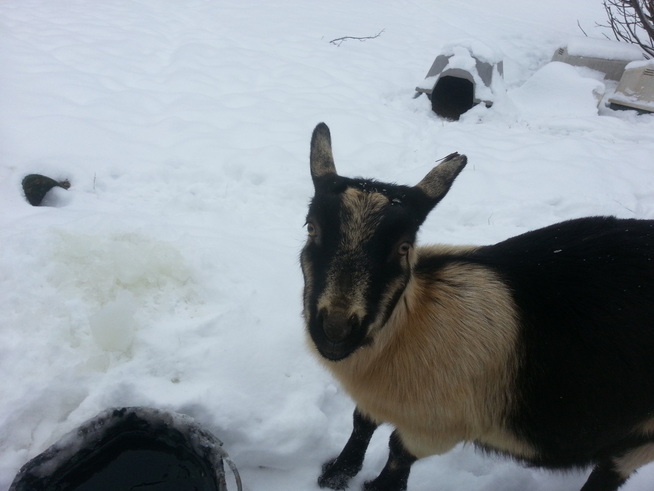 Sarah, the pure bred French Alpine doe, will be leaving the farm, along with her last summer's doeling and this year's kid, unless it is a female offspring of the Angora buck. Then I shall see. Sarah has only one baby at a time and she jumps the fence in winter. She is bred to be a milk goat.
Sarah, the pure bred French Alpine doe, will be leaving the farm, along with her last summer's doeling and this year's kid, unless it is a female offspring of the Angora buck. Then I shall see. Sarah has only one baby at a time and she jumps the fence in winter. She is bred to be a milk goat. Culling is done for two purposes. When an animal is unwanted for any reason, it are sent to the auction. Often a meat buyer will take those animals provided it is not sick and occasionally a farmer will pick the animal up too. Animals that do not fit the breeding program are not kept. On The Fat Ewe Farm, the most important traits for the ewes are that they are hardy and thrive on grass forage alone, they are worm resistant and also they lamb without aid and produce more than one baby. That pretty much fits most of the animals now, as this is the third year for the farm.
And the males, well, only a few are sold for breeding. The rest are food, sad as it seems. I cried when my last year lambs were killed and butchered because I saw them being born and raised them and knew them. Though I thanked them for their lives and honoured them, their loss was deeply felt. But what does one do? There are seven dogs to feed. Currently meat scraps and bones are purchased for them more economically than killing a lamb to feed them, but when an animal is butchered on the farm, then the scraps are utilized as well.
This summer will mean that some sheep, even Dora, who was one of my first three lambs, will have to go. Dora has never had a baby in the three years she has been here. She is a pet, yes, but this is a farm, not a zoo (though some might argue that point). I will try hard to find Dora a home, though who will want a barren ewe for a pet? See the problem? Then there is Little Johnny, the first ever lamb born here. His mother was bred when she arrived and lambed shortly after. He is a four horned Jacob and is quiet and very tame and friendly, but I cannot use him for breeding because he is related to every Jacob ewe here. What do I do with him? Lawn ornament? How many pets can I keep without going broke?
I am sure there will be much deliberation when the time comes to say goodbye to the animals here, but if they produce babies like last year, there will soon be 200 , not 100. For one person, it is not feasible, sigh. I wish.

 RSS Feed
RSS Feed